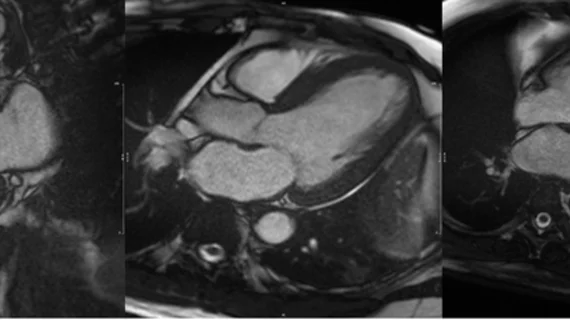MRI results help cardiologists predict heart failure risk
Cardiac magnetic resonance (CMR) imaging can help heart teams identify patients who face a heightened risk of developing heart failure, according to new research published in ESC Heart Failure.[1]
The study’s authors evaluated data from more than 39,000 participants from the UK Biobank study. The median age was 64 years old, and 53% were women. Overall, the group determined that that CMR-based estimates of pulmonary capillary wedge pressure (PCWP) were comparable to estimates captured from more invasive imaging techniques. Prior research had already confirmed these CMR-based estimates are capable of outperforming similar estimates based on echocardiography.
In addition, the group emphasized that PCWP readings taken from CMR data were an independent risk factor for heart failure and major adverse cardiovascular events.
“Heart failure is a lethal condition resulting from rising pressures,” co-lead author Dr. Pankaj Garg, an associate professor of cardiovascular medicine at the University of East Anglia (UEA), said in a statement. “One of the most significant findings of this study is that MRI-derived pressure measurements can reliably predict if an individual will develop heart failure. This breakthrough suggests that heart MRI could potentially replace invasive diagnostic tests. Participants with higher heart pressure measured by MRI had a fivefold increased risk of developing heart failure over six years.”
Other risk factors linked to an increased risk of heart failure included older age, male sex, high blood pressure, obesity and regular alcohol consumption.
“By combining these factors, we developed a model to predict individual heart failure risk,” co-lead author Dr. Nay Aung, a specialist with the William Harvey Research Institute at Queen Mary University of London, said in the same statement. “This advancement enables prevention, early detection and treatment of heart failure, which could save many lives.”
The group did note that the U.K. Biobank participants were primarily white; for this reason, additional research is still needed before these findings can be generalized to more diverse patient population. Overall, however, the group believes these findings “may have implications for developing targeted screening strategies.”
Click here for the full study in ESC Heart Failure, a Heart Failure Association of the European Society of Cardiology journal.

